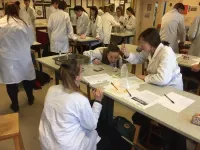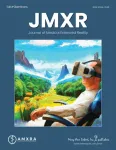(Press-News.org) Ahead of the 2024 US presidential election, The BMJ today launches a forward-looking series that highlights the lessons that can be learned from the US’s covid-19 experience and the actions that are needed to prevent the loss of another million citizens in the next pandemic and improve and protect population health.
The articles, written by leading clinicians and researchers across the US, explore topics such as how systemic racism and economic inequality contributed to covid-19 disparities; mass incarceration and poor prison health as a driver of the pandemic; labor market inequalities; and the impact of “the hollowing of the state” (the diminished role of the public sector).
The authors call for a set of crucial systemic reforms, which they believe should be central to the manifestos of the 2024 US presidential candidates.
Importantly, the aim of the series is not to assign blame—there is plenty to go around—but to look to the future and lay out critical steps that need to be taken to transform US public health and preparedness and improve population health more broadly.
In an editorial to launch the series, guest editors Gavin Yamey at the Duke Global Health Institute, Duke University and Ana V. Diez Roux at Drexel University Urban Health Collaborative explain how during the devastating global covid-19 pandemic, the United States suffered “eye-wateringly high” death rates compared to its peer nations.
The 1.16 million Americans killed by covid-19 represent 16% of global deaths in a nation with 4% of the world’s population, they write. About 300,000 children are estimated to have lost one or both parents, and there is a substantial burden of long covid.
The series documents the many complex, inter-related causes of the poor US pandemic response, underpinned by two key contexts.
The first is the nation’s pre-existing structural and systemic features, which contributed to devastating pandemic outcomes. These include gaps in health care and public health systems, the absence of social safety nets and workplace protections, ingrained social inequality, and systemic racism.
“These are key reasons why the nation suffered higher covid-19 mortality rates than its more equal counterparts, and why pandemic death in the US was so closely patterned by social class and race,” write the authors.
The second is that while the US had many scientific resources, the government showed a troubling inability to generate reliable information, communicate it in a timely and consistent manner, and translate it into sound policy.
These failures began at the top, argue Yamey and Diez Roux. President Trump lied frequently about the pandemic, and his suggestion of using bleach to fight covid-19 “came to symbolise the chaotic presidential communications in the pandemic’s first year.”
Poor communication of existing evidence also contributed to confusion and delayed actions. Such communication missteps is one reason for the partisan difference in how quickly states acted to institute public health protections and in excess death rates during the pandemic, especially in the period since vaccines became available.
Poor communication of evidence also led to inappropriate actions, they add.
For example, even after studies had shown that transmission by fomites (objects and surfaces) was rare and transmission outdoors was much less common than indoors, some municipalities or states kept parks, playgrounds, and beaches closed.
And after research had shown that schools could be reopened safely with basic public health measures, too many jurisdictions kept schools online only.
What’s more, the communication failures were compounded by federalism—the division of power between the national government and the 50 US states—which ensured that the covid-19 response depended on post code, showing the limits of federalism in the face of a deadly pandemic.
Yet despite these failures, they note that the pandemic also showed the US how a different role of government and society in protecting health is possible.
For instance, as well as rapid vaccine development, which was publicly funded, strategies such as expanded unemployment benefits, food assistance programs, expanded child health insurance coverage and Medicaid enrollment, and federal funding for public school upgrades, were put in place that helped to curb suffering and death.
“Of special relevance to the 2024 US Presidential election, they illustrate how a range of government actions, beyond health insurance, can be critical to protecting health in the next pandemic and beyond,” they conclude.
In the first article of the series, David Michaels at George Washington University and colleagues consider how covid-19 affected frontline workers in the US and what needs to be done to ensure they are better protected in future.
They argue that covid-19 disproportionately affected low wage workers who had to leave home and go to work to keep society functioning, and say actions by US occupational and public health agencies fell far short of what was needed to make workplaces safe during the pandemic.
They acknowledge that temporary social and economic interventions during the pandemic provided some relief to these workers, but say protecting worker health in the next pandemic requires action now for paid family and medical leave, better social supports, and better workplace protection policies.
END
Systemic US reforms needed to prevent mass death in the next pandemic
Experts highlight lessons that can be learned from the US’s covid-19 experience and say reforms should be central to 2024 US presidential candidate manifestos
2024-01-30
ELSE PRESS RELEASES FROM THIS DATE:
U.S. regulatory system failed to prevent thousands of deaths in frontline workers during the pandemic
2024-01-30
An analysis published today in the The BMJ examines the risks faced by frontline workers in the United States during the pandemic and suggests reforms that could protect population health and save lives.
Lead author Professor David Michaels at the George Washington University and his colleagues note that from the onset laws and regulations in the United States inadequately protected frontline workers. The gaps allowed a rapid spread of disease in US workplaces like meat packing plants. At the same time, these essential workers were rarely seen as a population that needed special attention ...
Innovative school Citizen Science project involving over 1000 scientists, 110 schools, 800 samples and U.K.’s synchrotron published in CrystEngComm
2024-01-30
Results of a large-scale innovative Citizen Science experiment called Project M which involved over 1000 scientists, 800 samples and 110 UK secondary schools in a huge experiment will be published in the prestigious RSC (Royal Society of Chemistry) journal CrystEngComm on 29 January 2024. The paper is titled: “Project M: Investigating the effect of additives on calcium carbonate crystallisation through a school citizen science program”. The paper shares a giant set of results from the school citizen scientists who collaborated with a team at Diamond to find out how different additives affect the different forms of calcium carbonate produced. These additives affect the ...
Probiotics promote weight loss in obese dogs
2024-01-29
Washington, D.C.—Researchers have identified 2 strains of probiotics that can be used to reduce weight in obese dogs. The research is published this week in Microbiology Spectrum, a journal of the American Society for Microbiology.
In the new study, the research team investigated metabolic diseases in companion animals and set out to identify probiotics suitable for long-term and safe treatment. “The initial challenge involved selecting specific metabolic diseases for examination, leading us to focus on the prevalent issue of 'obesity in pets,’” said study principal investigator Younghoon Kim, Ph.D., professor in the ...
Benchtop test quickly identifies extremely impact-resistant materials
2024-01-29
CAMBRIDGE, MA – An intricate, honeycomb-like structure of struts and beams could withstand a supersonic impact better than a solid slab of the same material. What’s more, the specific structure matters, with some being more resilient to impacts than others.
That’s what MIT engineers are finding in experiments with microscopic metamaterials — materials that are intentionally printed, assembled, or otherwise engineered with microscopic architectures that give the overall material exceptional properties.
In a study appearing today in the Proceedings of the National Academy of Sciences, the engineers report on a new way ...
Do tree-planting campaigns follow best practices for successful forest restoration?
2024-01-29
Global tree-planting campaigns have reached fad-like proportions over the past decade, and it’s easy to understand their appeal. Healthy forests help in the fight against climate change by absorbing some of our excess carbon dioxide emissions, and they can provide wildlife habitat and quality-of-life benefits for local human communities too. So why not plant more trees? It seems like an easy win.
But the problem is, there’s a huge difference between simply planting a tree and making sure that trees survive and grow over the long-term. And without the necessary ecological understanding or long-term planning and ...
Nearly two-thirds of low-risk pulmonary embolism patients are hospitalized after ED visit
2024-01-29
Embargoed for release until 5:00 p.m. ET on Monday 29 January 2024
Annals of Internal Medicine Tip Sheet
@Annalsofim
Below please find summaries of new articles that will be published in the next issue of Annals of Internal Medicine. The summaries are not intended to substitute for the full articles as a source of information. This information is under strict embargo and by taking it into possession, media representatives are committing to the terms of the embargo not only on their own behalf, but also on behalf of the organization they represent.
----------------------------
1. ...
Prenatal air pollution exposure linked to severe newborn respiratory distress
2024-01-29
HERSHEY, Pa. — Prenatal exposure to air pollution increases the risk of severe respiratory distress in newborn babies, according to new research conducted at the Penn State College of Medicine in collaboration with the Maternal-Infant Research on Environmental Chemicals (MIREC) Study led by Health Canada. The risk increases with exposure specifically to fine particulate matter (PM2.5) and nitrogen dioxide (NO2), which occur in wildfire and cigarette smoke and vehicle emissions, among other sources.
The findings, which published on Jan. 25 in the journal Environmental Health Perspectives, reveal a better understanding of ...
How a walk in nature restores attention
2024-01-29
New research from University of Utah psychology researchers is helping prove what American authors John Muir and Henry David Thoreau tried to teach more than 150 years ago: Time spent in nature is good for the heart and soul.
Amy McDonnell and David Strayer are showing it is good for your brain, too. Their latest research, conducted at the university’s Red Butte Garden, uses electroencephalography (EEG), which records electrical activity in the brain with small discs attached to the scalp, to measure participants’ attentional capacity.
“A walk in nature enhances certain executive control processes in the brain above and beyond the benefits associated with exercise,” ...
What is medical extended reality? New AMXRA guideline
2024-01-29
A new guideline to help define the emerging field of Medical Extended Reality. Which seeks to standardize terminology, categorize existing work, and provide a structured framework for future research development in MXR.
END ...
Emergency cardiovascular care impact goal outlines 3 target needs
2024-01-29
Statement Highlights:
Despite significant advances in research, education, clinical practice and community-based programs, survival from cardiac arrest remains low.
Significant disparities also exist in cardiac arrest outcomes.
This scientific statement specifically identifies impact goals to achieve or exceed by 2030 to improve cardiac arrest for all people.
DALLAS, January 22, 2024 — Only 10% of people who experience a cardiac arrest survive.[1] In new challenge goals outlined in the American Heart Association Emergency Cardiovascular Care 2030 Impact Goals and Call to Action to Improve Cardiac Arrest Outcomes, the American Heart Association’s volunteer ...
LAST 30 PRESS RELEASES:
Scientists reveal our best- and worst-case scenarios for a warming Antarctica
Cleaner fish show intelligence typical of mammals
AABNet and partners launch landmark guide on the conservation of African livestock genetic resources and sustainable breeding strategies
Produce hydrogen and oxygen simultaneously from a single atom! Achieve carbon neutrality with an 'All-in-one' single-atom water electrolysis catalyst
Sleep loss linked to higher atrial fibrillation risk in working-age adults
Visible light-driven deracemization of α-aryl ketones synergistically catalyzed by thiophenols and chiral phosphoric acid
Most AI bots lack basic safety disclosures, study finds
How competitive gaming on discord fosters social connections
CU Anschutz School of Medicine receives best ranking in NIH funding in 20 years
Mayo Clinic opens patient information office in Cayman Islands
Phonon lasers unlock ultrabroadband acoustic frequency combs
Babies with an increased likelihood of autism may struggle to settle into deep, restorative sleep, according to a new study from the University of East Anglia.
National Reactor Innovation Center opens Molten Salt Thermophysical Examination Capability at INL
International Progressive MS Alliance awards €6.9 million to three studies researching therapies to address common symptoms of progressive MS
Can your soil’s color predict its health?
Biochar nanomaterials could transform medicine, energy, and climate solutions
Turning waste into power: scientists convert discarded phone batteries and industrial lignin into high-performance sodium battery materials
PhD student maps mysterious upper atmosphere of Uranus for the first time
Idaho National Laboratory to accelerate nuclear energy deployment with NVIDIA AI through the Genesis Mission
Blood test could help guide treatment decisions in germ cell tumors
New ‘scimitar-crested’ Spinosaurus species discovered in the central Sahara
“Cyborg” pancreatic organoids can monitor the maturation of islet cells
Technique to extract concepts from AI models can help steer and monitor model outputs
Study clarifies the cancer genome in domestic cats
Crested Spinosaurus fossil was aquatic, but lived 1,000 kilometers from the Tethys Sea
MULTI-evolve: Rapid evolution of complex multi-mutant proteins
A new method to steer AI output uncovers vulnerabilities and potential improvements
Why some objects in space look like snowmen
Flickering glacial climate may have shaped early human evolution
First AHA/ACC acute pulmonary embolism guideline: prompt diagnosis and treatment are key
[Press-News.org] Systemic US reforms needed to prevent mass death in the next pandemicExperts highlight lessons that can be learned from the US’s covid-19 experience and say reforms should be central to 2024 US presidential candidate manifestos



